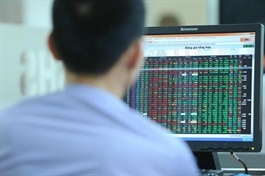Shares to go up after absorbing more supply
Shares to go up after absorbing more supply
Shares are forecast to continue their uptrend after absorbing more supply, said analysts.

On the Ho Chi Minh Stock Exchange, the VN-Index ended Friday at 1,179.25 points, down 0.25 per cent against the previous session.
The index gained a total 0.68 per cent last week.
An average of 553.3 million shares was traded on the southern exchange during each session last week, worth VND11.5 trillion (US$490 million).
“Although the market surpassed the disputed area of 1,182 points, the uptrend of the VN-Index was not sustained and investors took advantage of short-term profit taking. Looking at the weekly chart, VN-Index recorded a good support candle signal from the support area of 1,150 points. Therefore, the weakening factor of market is only temporary in the general recovering trend,” said Viet Dragon Securities Co (VDSC).
“It’s expected that VN-Index will continue to be supported when it retreats to 1,175 points and recovers again. Investors could still expect the market's uptrend after the current correction, and in the meantime, investors could continue to buy and accumulate stocks that are at strong support areas and showing signs of improvement.
“With the leading role of small and medium-cap stocks in the overall market, the pressure of profit-taking in this group is also the reason why VN-Index dropped more strongly than VN30-Index.
“VN-Index formed a single reversal pattern "Shooting star" accompanied by large matched volume, showing that short-term profit-taking is taking place relatively widely. With this signal, the market will need more time to absorb the supply and it is expected that VN-Index will continue to be supported when it drops back to 1,175 points.
“Therefore, investors can still expect a rally of the market after the current correction, and at the same time, they can continue to buy and accumulate stocks at strong support areas and showing signs of improvement,” VDSC said.
MB Securities Joint Stock Company said that the market adjusted slightly in the last session of last week but still recorded a gaining week, in the context that world stocks dropped after the US released inflation data.
“This shows that investors are focusing more on fundamental elements as businesses are announcing results in the second quarter,” it said.
“This week's liquidity has increased compared to last week's average and also reached the highest level in the past 3 weeks when the VN-Index increasingly consolidated at the bottom. Cash flow between leading stock groups was the highlight last week, from banking stocks to securities and steel stocks.
“Thus, the market is seeing a positive divergence, investors are paying more attention to opportunities in stock groups than referring to market indices,” MBS said.
Analysts from Yuanta Securities Vietnam said that the market may continue to increase and the VN-Index may retest the resistance level of 1,204 points in the coming sessions.
“The market is still in the short-term accumulation phase, so the cash flow is likely to remain low and differentiate among stock groups. The positive point is that the short-term uptrend of VNSmallcaps has been formed, so cash flow will tend to be concentrated in small- and mid-cap stocks.
“However, the short-term trend of the general market remains neutral. Therefore, from a cautious point of view, Yuanta Vietnam recommends that short-term investors can continue to stay out of the market. However, if investors have a high risk appetite, they can consider buying new with low weight,” it said.
Saigon-Hanoi Securities Joint Stock Company (SHS) said that it is possible to expect VN-Index to continue to recover this week with the target around the resistance area of the current downtrend at 1,185-1,190 points.
On the Ha Noi Stock Exchange, the HNX-Index lost 0.35 points (0.12 per cent) to end Friday at 284.4 points.
The index had gained 2.38 per cent last week.
An average of 67.4 million shares were traded on the northern market during each session last week, worth VND1.3 trillion.

























